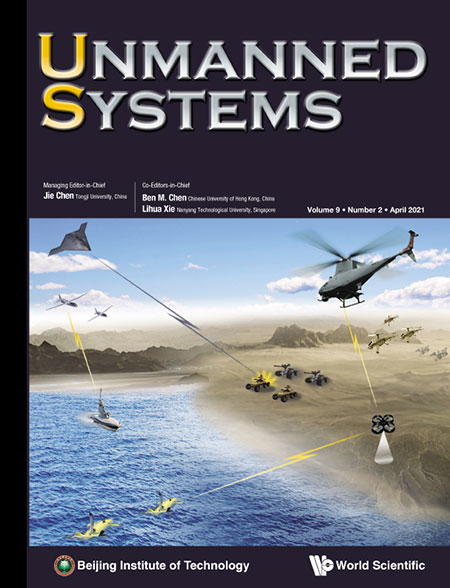多智能体系统的分布式编队控制:一种新的快速最优平衡微分对策方法
IF 2.4
3区 计算机科学
Q2 AUTOMATION & CONTROL SYSTEMS
引用次数: 0
摘要
本文提出了一种高效的快速最优平衡微分对策(DG)方法来解决网络多智能体系统(MASs)动态环境下的群体控制问题。与现有的后退地平线分布式微分对策(RH-DDG)方法相比,该方法采用两层博弈结构来平衡最优性和实时性,重点关注编队控制、避碰和避障。在离线层,问题被转换成一个分布式差分博弈(DDG),其中每个代理使用来自本地相邻代理的分布式信息计算策略。每个智能体的策略通过强连接的通信拓扑来实现唯一的全局纳什均衡(G-NE),为在线游戏提供最优参考轨迹。在在线层,提出了一种带事件触发机制的后退视界微分对策(RH-DGET)来跟踪G-NE轨迹。只有当事件触发条件满足时,才会触发自我玩家更新在线纳什策略,确保实时安全证书。严格的证明表明,在线Nash策略收敛到离线G-NE,直到触发结束,并且给定一定的停留时间条件以防止芝诺行为。仿真结果验证了该方法的有效性。本文章由计算机程序翻译,如有差异,请以英文原文为准。
Distributed formation control of multi-agent systems: A novel fast-optimal balanced differential game approach
This paper proposes an efficient fast-optimal balanced differential game (DG) approach to address the formation control problem in dynamic environments for networked multi-agent systems (MASs). Compared to existing receding horizon distributed differential game (RH-DDG) approaches, the proposed approach employs a two-layer game structure to balance optimality and real-time performance, with a focus on formation control, collision avoidance and obstacle avoidance. In the offline layer, the problem is converted into a distributed differential game (DDG) where each agent computes strategies using distributed information from locally neighboring agents. The strategy of each agent self-enforces a unique global Nash equilibrium (G-NE) with a strongly connected communication topology, providing an optimal reference trajectory for the online game. In the online layer, a receding horizon differential game with an event-trigger mechanism (RH-DGET) is presented to track the G-NE trajectory. Ego players are triggered to update online Nash strategies only when the event-triggering condition is satisfied, ensuring the real-time safety certificate. Rigorous proofs demonstrate that the online Nash strategies converge to the offline G-NE until the trigger ends, and a certain dwell time condition is given to prevent the Zeno behavior. Simulation results validate the effectiveness of the proposed approach.
求助全文
通过发布文献求助,成功后即可免费获取论文全文。
去求助
来源期刊

Unmanned Systems
AUTOMATION & CONTROL SYSTEMS-
CiteScore
8.50
自引率
30.20%
发文量
36
期刊介绍:
An unmanned system is a machine or device that is equipped with necessary data processing units, sensors, automatic control, and communications systems and is capable of performing missions autonomously without human intervention. Unmanned systems include unmanned aircraft, ground robots, underwater explorers, satellites, and other unconventional structures. Unmanned Systems (US) aims to cover all subjects related to the development of automatic machine systems, which include advanced technologies in unmanned hardware platforms (aerial, ground, underwater and unconventional platforms), unmanned software systems, energy systems, modeling and control, communications systems, computer vision systems, sensing and information processing, navigation and path planning, computing, information fusion, multi-agent systems, mission management, machine intelligence, artificial intelligence, and innovative application case studies. US welcomes original manuscripts in the following categories: research papers, which disseminate scientific findings contributing to solving technical issues underlying the development of unmanned systems; review articles and state-of-the-art surveys, which describe the latest in basic theories, principles, and innovative applications; short articles, which discuss the latest significant achievements and the future trends; and book reviews. Special issues related to the topics of US are welcome. A short proposal should be sent to the Editors-in-Chief. It should include a tentative title; the information of the Guest Editor(s); purpose and scope; possible contributors; and a tentative timetable. If the proposal is accepted, the Guest Editor(s) will be responsible for the special issue and should follow the normal US review process. Copies of the reviewed papers and the reviewers'' comments should be given to the Editors-in-Chief for recording purposes.
 求助内容:
求助内容: 应助结果提醒方式:
应助结果提醒方式:


